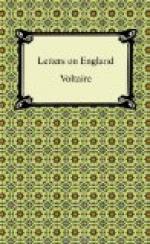Such a persecution from all sides, must necessarily suppose a most exalted merit as well as a very distinguished reputation, and indeed he possessed both. Reason at that time darted a ray upon the world through the gloom of the schools, and the prejudices of popular superstition. At last his name spread so universally, that the French were desirous of bringing him back into his native country by rewards, and accordingly offered him an annual pension of a thousand crowns. Upon these hopes Descartes returned to France; paid the fees of his patent, which was sold at that time, but no pension was settled upon him. Thus disappointed, he returned to his solitude in North Holland, where he again pursued the study of philosophy, whilst the great Galileo, at fourscore years of age, was groaning in the prisons of the Inquisition, only for having demonstrated the earth’s motion.
At last Descartes was snatched from the world in the flower of his age at Stockholm. His death was owing to a bad regimen, and he expired in the midst of some literati who were his enemies, and under the hands of a physician to whom he was odious.
The progress of Sir Isaac Newton’s life was quite different. He lived happy, and very much honoured in his native country, to the age of fourscore and five years.
It was his peculiar felicity, not only to be born in a country of liberty, but in an age when all scholastic impertinences were banished from the world. Reason alone was cultivated, and mankind could only be his pupil, not his enemy.
One very singular difference in the lives of these two great men is, that Sir Isaac, during the long course of years he enjoyed, was never sensible to any passion, was not subject to the common frailties of mankind, nor ever had any commerce with women—a circumstance which was assured me by the physician and surgeon who attended him in his last moments.
We may admire Sir Isaac Newton on this occasion, but then we must not censure Descartes.
The opinion that generally prevails in England with regard to these new philosophers is, that the latter was a dreamer, and the former a sage.
Very few people in England read Descartes, whose works indeed are now useless. On the other side, but a small number peruse those of Sir Isaac, because to do this the student must be deeply skilled in the mathematics, otherwise those works will be unintelligible to him. But notwithstanding this, these great men are the subject of everyone’s discourse. Sir Isaac Newton is allowed every advantage, whilst Descartes is not indulged a single one. According to some, it is to the former that we owe the discovery of a vacuum, that the air is a heavy body, and the invention of telescopes. In a word, Sir Isaac Newton is here as the Hercules of fabulous story, to whom the ignorant ascribed all the feats of ancient heroes.




